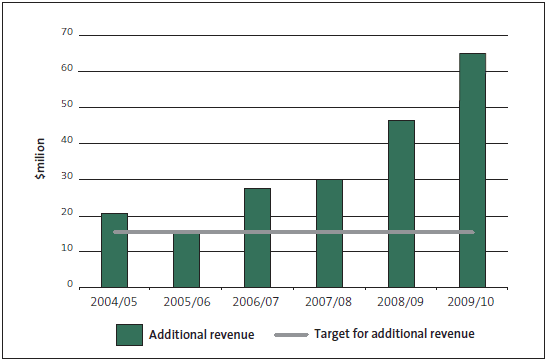Part 2: Planning for revenue assurance
2.1
In this Part, we discuss:
- how Customs plans its revenue assurance work;
- Customs' risk-based approach to revenue assurance work;
- the coverage of revenue assurance work; and
- the additional revenue that Customs collects.
Effective systems for planning revenue assurance work
2.2
Trade Assurance has a sound framework for planning revenue assurance work and selecting traders to audit. The elements of its framework are well established, logical, and comprehensive.
2.3
Trade Assurance uses a strategy to guide its planning for revenue assurance work. This strategy helps it plan the specific audits it needs to do.
2.4
Trade Assurance uses intelligence reports, trader profiling, the results of previous audits, and other information to select traders for its annual programme of field audits. The Intelligence, Planning, and Co-ordination business unit prepares some of this information for Trade Assurance. The comprehensive information that Trade Assurance uses and its processes for selecting traders mean that it focuses on traders who present the greatest risks. It is clear why Trade Assurance has selected specific traders for these audits.
2.5
Trade Assurance records information about, and is aware of, broader environmental factors that could affect how traders who owe money to Customs behave.
2.6
The information that Trade Assurance gathers and the way it uses that information to select traders to audit help to ensure that its revenue assurance work is effective.
2.7
Trade Assurance plans to regularly audit traders who import, or have excise licences for, goods that make a large contribution to customs revenue. This is appropriate because regular audits in these areas are important for Customs to be able to give assurance about the revenue it collects.
2.8
Trade Assurance's planning and systems and the assurance they can provide for bulk fuel audits are clear.
2.9
Customs duty and GST on imported bulk fuel products contribute significantly to the revenue that Customs collects each year. In 2009/10, customs revenue from bulk fuel imports was more than $1.5 billion, which is about 17% of its total revenue. Trade Assurance carries out regular audits of bulk fuel imports. We reviewed the planning, systems, and guidance Trade Assurance has for these audits.
2.10
Trade Assurance has good planning, systems, and guidance for protecting customs revenue from bulk fuel imports. These provide for efficient bulk fuel audits and include a formal check of all work done. We advised Trade Assurance about how it could make decisions about bulk fuel audits more transparent.
2.11
Flexibility is important in planning. Trade Assurance structures its audit programme so that it can respond easily to emerging issues or to changes in staff resourcing. Trade Assurance's rationale for prioritising its work is clearly documented. Building flexibility into its work programme helps Trade Assurance ensure that its work continues to focus on the most important areas.
A risk-based approach to revenue assurance
2.12
Trade Assurance identifies and analyses risk at each stage of its planning for revenue assurance work. This allows it to focus on the areas with the greatest risks for New Zealand.
2.13
Trade Assurance has a framework that allows it to evaluate risks consistently. It uses a list of organisational and operational risks, and consistently records information about risk in its plans. It clearly and consistently records information about risks, including risks to revenue, within audit reports to help plan audits in the year ahead. These practices help Trade Assurance to be effective.
What revenue assurance covers
2.14
To help plan its work, Trade Assurance assigned goods that are imported or exported or that are subject to excise into 36 "trade sectors". Each year, it selects some sectors and audits selected traders in those sectors. It does other kinds of audits of most of the other sectors.
2.15
The way Trade Assurance plans revenue assurance work and selects traders means that it covers the different trade sectors reasonably. Trade Assurance can do more to document how its revenue assurance work covers the 36 trade sectors. This would allow managers to see where there are gaps in coverage of sectors.
Observations on the additional revenue that Customs collects
2.16
Customs consistently meets its target to collect at least $15 million of additional revenue – revenue that traders owe to Customs but that they have not declared or have under-declared. Figure 1 shows the target and the additional revenue Customs has collected since the target was set in 2004/05.
Figure 1
Customs' performance against its target for collecting additional revenue

2.17
The additional revenue Customs collects can vary greatly. Sometimes, this can be because Customs identifies one or more traders who owe a substantial amount – say, $10 million – of additional revenue. This was the case in 2009/10.
2.18
Customs noted in its Annual Report 2009/10 that "the bulk of the additional revenue recovered in 2009/10 was due to three specific instances of identification by Customs of revenue owing and subsequent payment of those sums". This was useful to include in the annual report because it indicated the underlying reasons why Customs exceeded its target so significantly.
2.19
Trade Assurance staff told us that their business unit had identified most of the additional revenue that traders owed to Customs.
2.20
Customs does not specifically measure how much it spends identifying additional revenue. This is because Trade Assurance's overall work programme and many of its audits are structured to provide assurance for various trade risks, such as unfair trade and the accuracy of trade and economic data, as well as assurance about revenue. Trade Assurance has a budget of $5.4 million.
2.21
Based on field audit data we saw for 2009/10 and 2010/11, the way Trade Assurance uses information to select traders for revenue assurance activities significantly affects the additional revenue gained. The risk-based targeting that Trade Assurance uses in selecting entities for planned work allows it to maximise the assurance about customs revenue that it provides and the potential additional revenue it can collect.

